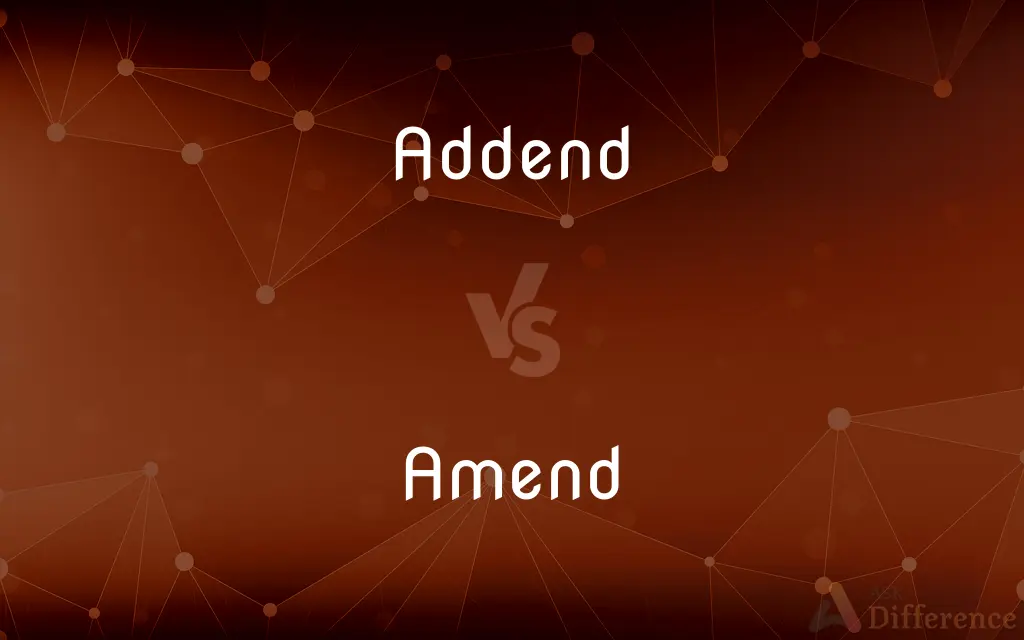Addend vs. Amend — What's the Difference?
Edited by Tayyaba Rehman — By Fiza Rafique — Updated on May 17, 2024
Addend refers to a number or quantity to be added in mathematics, while amend means to make changes or improvements to a document or text.

Difference Between Addend and Amend
Table of Contents
ADVERTISEMENT
Key Differences
Addend is a term used in mathematics to denote a number that is added to another in an addition operation. It focuses specifically on the elements involved in the mathematical process of addition. On the other hand, amend is a verb that means to make changes to something, often to improve it or correct errors, commonly used in legal or formal documents.
Addend typically appears in contexts involving arithmetic and basic math operations, such as when teaching or solving addition problems. In contrast, amend is widely used in legal, formal, and editorial contexts where adjustments or corrections are required in documents, laws, or texts.
In educational settings, addend is introduced to help students understand the components of addition equations. Meanwhile, amend is relevant in professional and academic environments where precise and accurate language or regulations are necessary, highlighting the process of making revisions.
Addend is a static term that remains within the realm of arithmetic operations, while amend is dynamic, reflecting the act of modification. Amend conveys a sense of improvement or correction, often carrying legal or procedural implications that addend does not.
The concept of addend is straightforward, dealing solely with numerical values and their summation. In contrast, amend encompasses a broader scope, including the revision of texts, laws, and other formal writings, implying an active process of refinement.
ADVERTISEMENT
Comparison Chart
Definition
A number to be added in an addition equation
To make changes or improvements to something
Usage Context
Mathematics, arithmetic
Legal, formal, editorial
Nature
Static, numerical
Dynamic, corrective
Educational Focus
Elementary arithmetic concepts
Legal and formal document revisions
Implication
Summation of numbers
Improvement or correction of content
Compare with Definitions
Addend
An element of addition.
Each addend contributes to the total sum.
Amend
To make changes for improvement.
The committee voted to amend the policy.
Addend
A component in summation.
Identify the addends in this addition problem.
Amend
To alter for better accuracy.
They had to amend the report to correct the errors.
Addend
A figure added to another.
The addend 4 results in a sum of 10 when added to 6.
Amend
To update or modify.
The law was amended to address new concerns.
Addend
A number to be added in a math problem.
In the equation 5 + 3, both 5 and 3 are addends.
Amend
To revise a document.
Please amend the contract to include the new clause.
Addend
A value in an addition equation.
Write the addends of the given sum.
Amend
To improve through changes.
She amended her speech after receiving feedback.
Addend
Any of a set of numbers to be added.
Amend
Make minor changes to (a text, piece of legislation, etc.) in order to make it fairer or more accurate, or to reflect changing circumstances
The rule was amended to apply only to non-members
Addend
(mathematics) Addendum, any one of two or more numbers or other terms that are to be added together.
Amend
Improve the texture or fertility of (soil)
Amend your soil with peat moss or compost
Addend
(organic chemistry) A moiety added to another molecule.
Amend
To change for the better; improve
"The confinement appeared to have had very little effect in amending his conduct" (Horatio Alger).
Addend
To furnish with an addendum.
Amend
To alter the wording of (a legal document, for example) so as to make more suitable or acceptable.
Addend
(organic chemistry) To furnish with an addend.
Amend
To enrich (soil), especially by mixing in organic matter or sand.
Addend
A number that is added to another number.
Amend
To better one's conduct; reform.
Addend
A number that is added to another number (the augend)
Amend
(transitive) To make better; improve.
Amend
(intransitive) To become better.
Amend
To heal (someone sick); to cure (a disease etc.).
Amend
To be healed, to be cured, to recover (from an illness).
Amend
(transitive) To make a formal alteration (in legislation, a report, etc.) by adding, deleting, or rephrasing.
Amend
An act of righting a wrong; compensation.
Amend
Clip of amendment
I've sent over a new version of the doc with some amends.
Amend
To change or modify in any way for the better
Mar not the thing that can not be amended.
An instant emergency, granting no possibility for revision, or opening for amended thought.
We shall cheer her sorrows, and amend her blood, by wedding her to a Norman.
Amend
To grow better by rectifying something wrong in manners or morals; to improve.
Amend
Make amendments to;
Amend the document
Amend
To make better;
The editor improved the manuscript with his changes
Amend
Set straight or right;
Remedy these deficiencies
Rectify the inequities in salaries
Repair an oversight
Common Curiosities
What does it mean to amend a document?
To amend a document means to make changes or improvements to it. e.g., They amended the contract to reflect the new terms.
What is an addend in mathematics?
An addend is a number involved in an addition operation. e.g., In 7 + 2, both 7 and 2 are addends.
What is the main function of an addend?
The main function of an addend is to be added to another number to form a sum. e.g., In the sum 9 + 3, both numbers are addends.
What does 'to amend' imply about the original document?
It implies the document needs improvement or correction.
Is 'addend' used outside mathematics?
No, addend is specifically a mathematical term.
Are addends always whole numbers?
No, addends can be any numbers, including fractions and decimals.
What is an example of amending a document?
Adding a new clause to a contract is an example of amending a document.
Can amend be used in casual language?
Yes, amend can be used in everyday language to indicate making changes or improvements.
Why is amending important in legal contexts?
Amending ensures accuracy and relevancy in legal documents.
Are addends used in multiplication?
No, addends are specific to addition.
How often are amendments made to laws?
Laws are amended regularly to adapt to new situations and requirements.
Can addends be negative numbers?
Yes, addends can be negative in arithmetic operations.
Is an addend the same as a term in an equation?
No, an addend specifically refers to numbers being added, while a term can be any part of an equation.
Can multiple addends be used in one equation?
Yes, you can have multiple addends in an addition equation. e.g., In 4 + 5 + 6, all numbers are addends.
How is amending different from editing?
Amending often refers to formal and legal changes, while editing can be any type of content adjustment.
Share Your Discovery

Previous Comparison
Deed vs. Indenture
Next Comparison
Lorrie vs. TruckAuthor Spotlight
Written by
Fiza RafiqueFiza Rafique is a skilled content writer at AskDifference.com, where she meticulously refines and enhances written pieces. Drawing from her vast editorial expertise, Fiza ensures clarity, accuracy, and precision in every article. Passionate about language, she continually seeks to elevate the quality of content for readers worldwide.
Edited by
Tayyaba RehmanTayyaba Rehman is a distinguished writer, currently serving as a primary contributor to askdifference.com. As a researcher in semantics and etymology, Tayyaba's passion for the complexity of languages and their distinctions has found a perfect home on the platform. Tayyaba delves into the intricacies of language, distinguishing between commonly confused words and phrases, thereby providing clarity for readers worldwide.












































